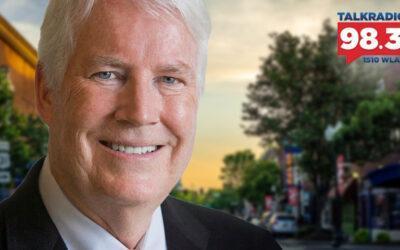Live from Music Row, Tuesday morning on The Tennessee Star Report with Michael Patrick Leahy – broadcast on Nashville’s Talk Radio 98.3 and 1510 WLAC weekdays from 5:00 a.m. to 8:00 a.m. – host Leahy welcomed marketing guru, Craig Huey of The Huey Report in studio to...
Crom Carmichael: Defining Infrastructure and the Systemic Crushing of the Middle Class
Monday morning on the Tennessee Star Report, host Michael Patrick Leahy welcomed the original all-star panelist Crom Carmichael in studio to clarify the definition of infrastructure and the systemic crushing of the middle class.
Former Speaker of the Tennessee House Beth Harwell Discusses Maneuvering Around and Up the Ladder at the Tennessee Capitol
Thursday morning on the Tennessee Star Report, host Michael Patrick Leahy welcomed Beth Harwell, former Speaker of the Tennessee House of Representatives to the studio to discuss successes and failures on the path to Speakership.
Direct Marketing Expert Craig Huey Explains the Left Wing Groups in Nashville Organized to Get Out the Vote
Thursday morning on the Tennessee Star Report, host Michael Patrick Leahy welcomed The Huey Reports, Craig Huey to the studio who revealed the combination of left-wing groups conspiring to aid business elites and top corporations to destroy the small business owner.
Washington Correspondent Neil McCabe Weighs In on the Killing of 800,00 Jobs by Death Tax
Wednesday morning on the Tennessee Star Report, host Michael Patrick Leahy welcomed Washington Correspondent for the Tennessee Star Neil McCabe to the newsmakers line to weigh in on his latest piece addressing the death tax of Joe Biden.
Job Creators Network CEO Alfred Ortiz Talks About the Response He’s Received on Time Square Billboard
Tuesday morning on the Tennessee Star Report, host Michael Patrick Leahy welcomed CEO of Job Creators Network and the man behind the iconic billboard in Times Square Alfredo Ortiz to the newsmakers line to talk about MLB Commissioner Manfred’s strikes and balls and the destruction of small business in America.
CCO of Job Creators Network Elaine Parker Describes Their Advocacy for Small Businesses
Tuesday morning on the Tennessee Star Report, host Michael Patrick Leahy welcomed CCO Elaine Parker of Job Creators Network to the newsmakers line to discuss their advocacy for small businesses nationwide.
Second Avenue Owner of Simply the Best and Ensemble Geoffrey Lee Discusses the Loss of His Businesses in Nashville Downtown Blast
Thursday morning on the Tennessee Star Report, host Michael Patrick Leahy welcomed Downtown Nashville small business owner Geoffrey Lee to the newsmakers line to talk about the loss of his two retail businesses in the bombing Christmas Day.








